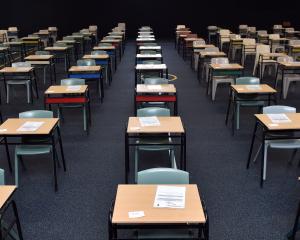David McKenzie believes New Zealand education heritage is being betrayed.
I am angry. I am watching a Minister of Education, who no doubt is sincere, being led up the garden path by advisers who are either incompetent or just plain "crackers".
I am watching a system of public schooling, built up over generations and widely recognised for its quality, being eroded almost overnight.
And I remind myself that none of this will be of any help to the underperforming sector of the school population identified by the Minister of Education, Hekia Parata.
She tells us quality teaching and learning is her aim and then goes on to claim good teaching and learning has nothing to do with class size.
She also tells us heroically that she is taking the tough decisions but the truth is she is making silly decisions which have tragic consequences.
In my working life, I served, among other things, as a deputy chairman of the New Zealand Council of Education Research.
I have kept up my interest in research findings in education and I can tell the minister unequivocally that research worldwide, contrary to what she has been told, demonstrates class size (as one might expect) does make a difference to the quality of classroom learning, especially among the least privileged sectors of the school population.
Parents and teachers should not be fooled.
The minister's claim size is of lesser importance than teaching "quality" is based upon the published work of one academic who now lives and works in Australia and I am not sure even he would support the minister's new policy of increasing class size.
We should be clear about what is being done to public education in New Zealand. In the interests of quality and "teacher development", (whatever that is), children in intermediate schools are going either to be taught in classes of up to 40 or lose their specialist teacher in cooking, woodwork, metalwork and art; or both of these things.
In a panic reaction, the Prime Minister hastily announced the measures in the Budget would not be quite so drastic as first publicised.
But there is little comfort to be taken from this. The end result will be just the same. It is just that the knifing of staff in some schools will take place at a slower pace.
I appreciate we live in tough times and the Government is hardly to blame for the financial woes of Europe and natural disasters such as the Christchurch earthquake.
But belt-tightening is something that should manifest fairness and I am appalled to see a smiling minister tell us she is reducing the educational opportunities of all children who attend public schools.
One of the proudest things about New Zealand's educational heritage is that our public schools have never been inferior institutions.
This is a significant contrast between ourselves and countries such as Australia and the United Kingdom; a contrast likely to be set aside.
I certainly do support the right of those parents who choose to send their children to private schools but I am jealous of what we achieved in our public schools over generations.
It identifies us as a nation.
I hope that I am no blind defender of the status quo, however.
We should always be looking for ways to improve what we do and our model of local school governance should always attest also that our schools belong to the people.
When times are hard financially we might, however, expect sacrifices to be made on an equitable basis.
Thus, I might have expected a zero Budget to have transferred the substantial public assistance given to private schools to those schools in marginal areas where the need is greatest.
Instead, for all Hekia Parata's fine words, the zero Budget has become one in which the State has pinched money from paper boys and now threatens to pinch their woodwork teacher, as well.
David McKenzie is a former associate professor of education at the University of Otago.












